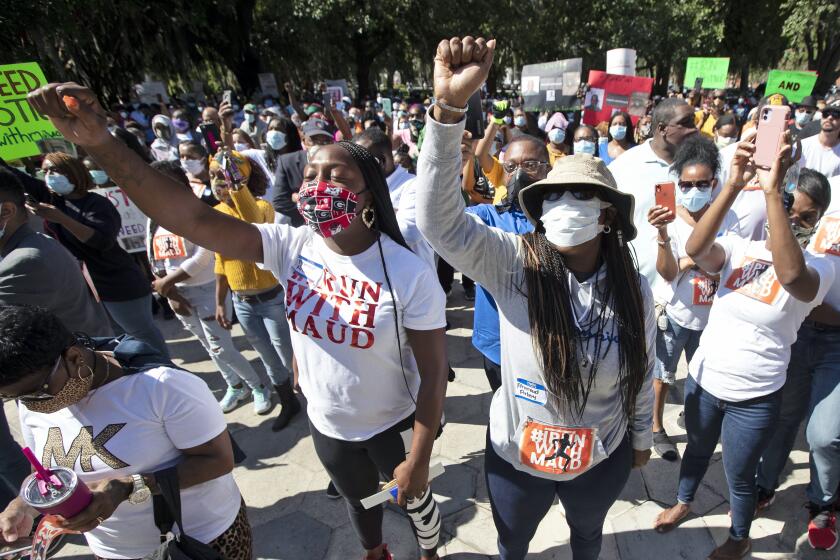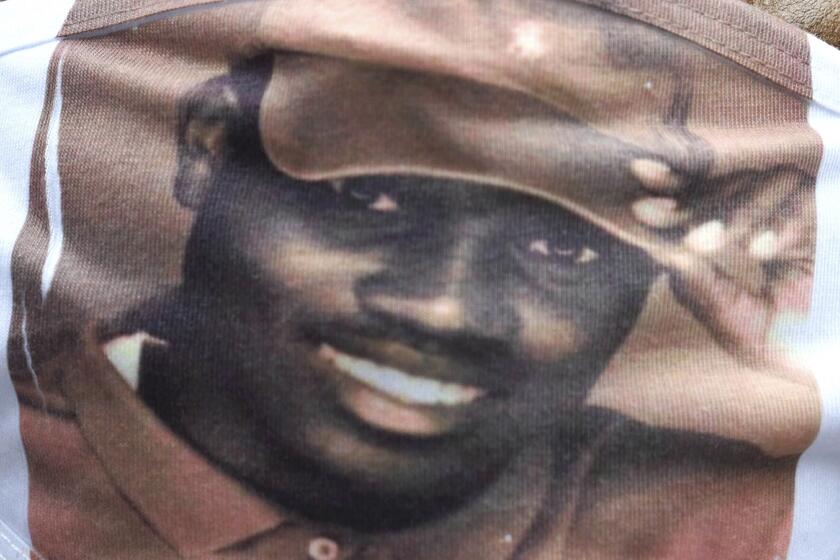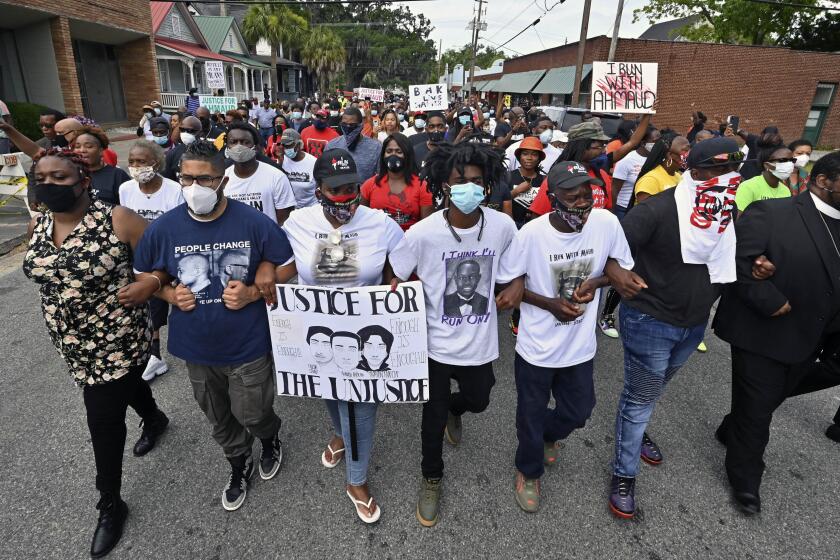In his final days, Ahmaud Arbery’s life was at a crossroads

- Share via
BRUNSWICK, Ga. — He was at a crossroads, his life stretching out before him, his troubles largely behind him. He had enrolled at South Georgia Technical College, preparing to become an electrician, just like his uncles. But first, he decided, he would take a break. College could wait until the fall.
To help keep his head clear, he ran, just about every day. Off he’d go, out the doors of his mother’s house, down the long street toward Fancy Bluff Road. Then would come the right turn onto the two-lane road lined by oak trees draped with Spanish moss.
About a mile and a half into his usual route, Ahmaud Arbery would cross the four lanes of Jekyll Island Causeway into the subdivision of Satilla Shores.
Three months ago, at the age of 25, he ran through Satilla Shores for the final time.
On Feb. 23, Arbery was shot to death by a father and son who told police they grabbed guns and pursued him in a pickup truck because they believed he was responsible for break-ins in their neighborhood — a black man, killed by two white men.
Before Arbery’s name joined a litany of hashtags bearing young black men’s names, he was a skinny kid whose dreams of an NFL career didn’t pan out. Those who knew him speak of a seemingly bottomless reservoir of kindness used to encourage others, of an easy smile and infectious laughter that could lighten just about any situation.
For many Americans, Arbery’s killing harks back to the old Jim Crow days when white mobs hunted black men down and killed them with impunity. In Brunswick, the shooting has sparked an uneasy conversation about race and power.
They also acknowledge the legal troubles that cropped up after high school: five years of probation for carrying a gun onto the high school campus in 2013, a year after graduation, and shoplifting from a Walmart store in 2017, a charge that extended the probation up until the time of his death.
His mother, Wanda Cooper-Jones, accepted that he was a young adult living at home, like so many of his contemporaries, taking a breather to chart how he’d one day support himself.
She had one rule: “If you have the energy to run the roads, you need to be on the job.”
So he worked at his father’s car wash and landscaping business, and previously held a job at McDonald’s.
A video released Monday shows police in Georgia attempting to search Ahmaud Arbery’s parked car in 2017.
Born May 8, 1994, Ahmaud Marquez Arbery was the youngest of three children, answering to the affectionate nicknames “Maud” and “Quez.”
When he was a teenager, his family worried because he never seemed to want to go out with friends. But that reserve was left behind when Arbery entered Brunswick High School’s class of 2012.
Like his brother, Marcus Jr., Ahmaud tried out for the Brunswick Pirates football team. His slender build certainly didn’t make him a shoo-in for linebacker on the junior varsity squad, said Jason Vaughn, his former coach and an American history teacher at the school. But he had incredible speed.
“He was undersized, but his heart was huge,” the coach said.
News Alerts
Get breaking news, investigations, analysis and more signature journalism from the Los Angeles Times in your inbox.
You may occasionally receive promotional content from the Los Angeles Times.
And off the field, Arbery had a talent for raising the spirits of the people around him — and a penchant for imitating his coach, Vaughn said.
“If I was standing in the hallway, kind of looking mean or having a bad day — maybe my lesson plan didn’t go right — Maud could kind of sense that about me,” Vaughn said. “He’d come stand beside me and be like, ‘I’m Coach Vaughn today. Y’all keep going to class. Hurry up, hurry up!’ … He was always trying to make people smile.”
Former teammate Demetrius Frazier grew up just down the street and knew Arbery most of his life. Frazier treasured their quieter moments in high school — just two friends playing video games, shooting hoops, wolfing down peanut butter and jelly sandwiches, hot dogs and chips.
Those were the times his friend seemed happiest, Frazier said, before his legal troubles bogged him down. Arbery’s football aspirations had been dashed, but he still wanted so much for himself, his friend said.
“Ahmaud was just ready to put himself in a position to be where he wanted to be in life,” he said. “That’s what they took from him.”
Artivist Nikkolas Smith combines personal storytelling with issues of national significance in his work.
Less than two weeks before Arbery was killed, 34-year-old Travis McMichael had called 911 to report a possible trespasser inside a house under construction in the subdivision, describing him as “a black male” and saying he feared the person was armed.
The Arbery family’s attorneys have confirmed that Ahmaud was captured on security cameras entering that home on the day he was killed. The property owner said nothing appeared to have been stolen, however, and surveillance footage also shows other people coming in and out of the construction site on other days.
Travis McMichael and his 64-year-old father, Gregory McMichael — a former police officer and retired investigator for the Glynn County district attorney — were charged with murder and aggravated assault on May 7, the day before Arbery would have turned 26.
They were arrested after cellphone video of the shooting taken by another man at the scene was released to a local radio station. Gregory McMichael told police that Arbery attacked his son and then was shot in a struggle over Travis’ shotgun.
On Thursday came the arrest of the man who filmed Arbery’s killing, William “Roddie” Bryan Jr., on charges of felony murder and criminal attempt to commit false imprisonment. His attorney has said Bryan bears no criminal responsibility for Arbery’s death.
An investigative agency and prosecutor must untangle the probe of Ahmaud Arbery’s killing, build a case and make up for lost time and missed chances.
For Arbery’s family, the pain of his loss is magnified by his final moments being captured on video.
“I didn’t want to watch it. I didn’t want my children to watch anything like that, to see their brother get killed,” said Arbery’s father, Marcus Arbery Sr.
Lee Merritt, an attorney for the family, said the circumstances of Arbery’s life touched on something deeper about American society.
“Our ravenous criminal justice system tends to take young black men in their teenage years, introduces them to the system and never lets them out again,” he said. But when Arbery died, “he was at a point of transition.”
Ultimately, Cooper-Jones said, nothing her son did in his short life justified the way he died.
“I will get answers — that was my promise,” she said. “That’s the last thing that I told him, on the day of his funeral: that Mama will get to the bottom of it.”
More to Read
Sign up for Essential California
The most important California stories and recommendations in your inbox every morning.
You may occasionally receive promotional content from the Los Angeles Times.













